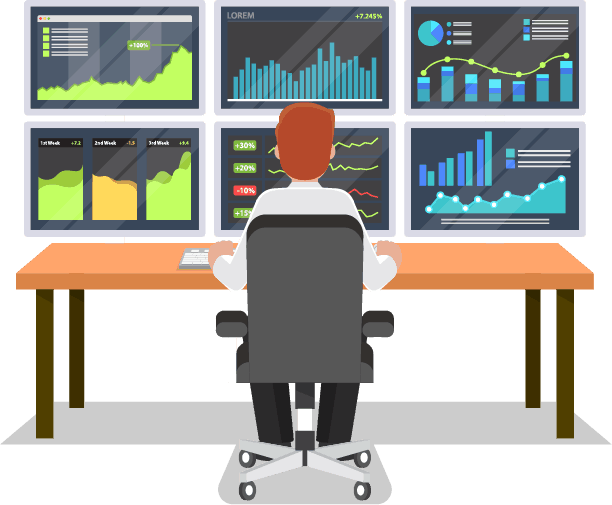In today’s world, losing is avoided at all costs, seen as a sign of weakness and failure that you should hope to avoid again in the future. In finance especially, losers are looked down upon and barely given a second thought as the focus shifts to winning at all costs.
The reality of trading – and life really – is that losing is one of the best things that can happen to us because it enables growth. Learning from our mistakes allows us to progress and develop in a way that leaves lasting lessons that we can draw immense value from.
When it comes to forex trading, you’re going to need to get used to losing. Plain and simple.
Let me explain why…
Simply Inevitable
The amount of trades you are going to take and the countless different scenarios you will find yourself trading in will never be one and the same – each trade is unique
The price action will be different, the news released on any given day is going to be different, the currency you trade will be at differing levels of strength, your mindset is likely never going to be consistent – just to name a few things that make every trade unique.
Due to all these factors you can’t possibly get it right 100% of the time. In fact, getting it right 70% of the time is absurdly high.
You have to move the goal posts for what your expectations are in relation to the traditional meaning of “success” in trading.

Losing trades is part of the job in forex trading. I guarantee you, you will lose a lot of trades, at some point losing the majority of trades in a month.
But you know what – the best traders also lose a lot and will have lost most of their trades in a month at multiple points in their career.
The differentiating factor here is the response to the losing. Statistically, we are all going to lose and not just once or twice. You will experience a losing streak – everyone does.
I have a tool in my course that you can use to calculate what your expected largest losing streak is going to be depending on your win rate.
Your reaction to these things is what defines your trading career. Knowing what to expect in that sense can help to keep all the losing in perspective.
Further to this, you don’t actually need to win more than 50% of your trades in order to be profitable. Depending on your rules with your risk-to-reward ratio, you could be profitable with a win rate as low as 35%!
Personally, I try to target a 60% win rate with an approach that has my winners doubling my losses. For example, on the average loss if I lose $1, on the average win I make $2. This is represented in your risk-to-reward ratio as 1:2.
What Not To Do
Even though knowing how much losing you can expect to see is useful, another benefit of losing that we can’t ignore is the value of knowing what not to do in the future.
Look, there are a whole host of different approaches to trading forex. Techniques, strategies, opinions – all are diverse and different with trading and all of them come with their own pitfalls, drawbacks and weaknesses.

Losing actually helps us to figure out where we might go wrong in the future and then understand how to avoid making the same mistake again. Experience is one thing that cannot be taught in forex trading.
Try as I might, over the last 15 years it is the one thing that I have felt held back by because there is a lot of knowledge that comes with experience. For myself, a large part of that knowledge is knowing what not to do.
This comes in the form of knowing when not to trade, when to leave my charts based off of my own psychology, or something as small as knowing when not to extend my target.
Knowing what you shouldn’t do only comes with experience and typically the experience of losing.
So when you come up against a loss, don’t fall into the trap of thinking it is a negative moment in your trading career. These are the moments that will define your trading and whether or not you become successful.
Learning From Mistakes
Following on from the previous section, turning these losses into positive moments is more than possible by a really simple process of learning from them.
Turning our traditional notions of losing on their head is difficult, no doubt. We have been conditioned to quantify success with winning – breaking out of that takes time.
Fortunately, we are told to learn from our mistakes and in this sense we can move to something familiar in order to push back against these notions of success and winning being one and the same.
The reason why we journal trades is so that we can analyze all of our data. And when I saw all, I mean all data: both the wins and the losses. It allows us to learn from our mistakes and know what steps to take in future scenarios.
If you make a mistake and lose a trade due to that problem, you gain invaluable knowledge just by the experience alone. Remember what I have been saying about experience?
It is the one thing that can’t be taught. It is arguably the most valuable part of your trading trove of knowledge though.

Part of all this is related to trading psychology in that the onus is on you to not let these negative experiences drag you down. Learn from them, analyze your mistakes, adjust your approach and you will be able to turn something that is seen as traditionally negative into something that enables your success.
Trading can be difficult to take on because of this requirement of learning to lose. However, in my experience, the losses and false steps actually benefited my learning more than any of my winning trades.
Without those losses, I couldn’t navigate my way around those trades that then turned into big, consistent winners.
At the end of the day, that’s what we all want from our trading!


Comments are closed.